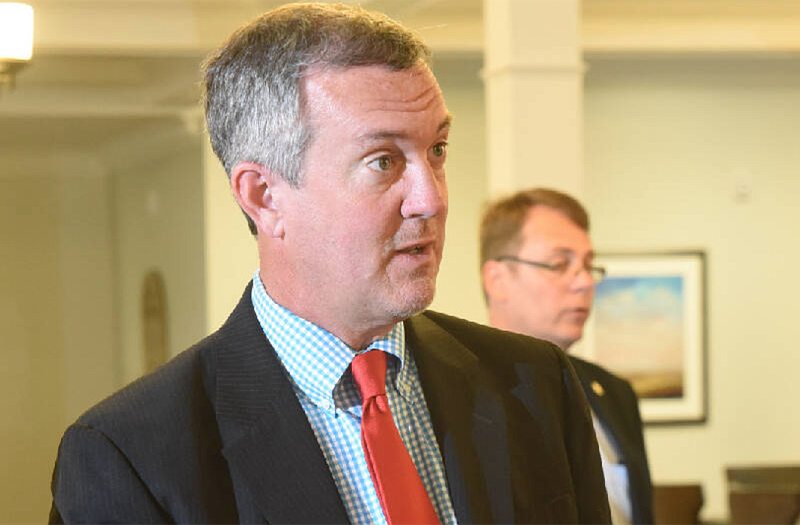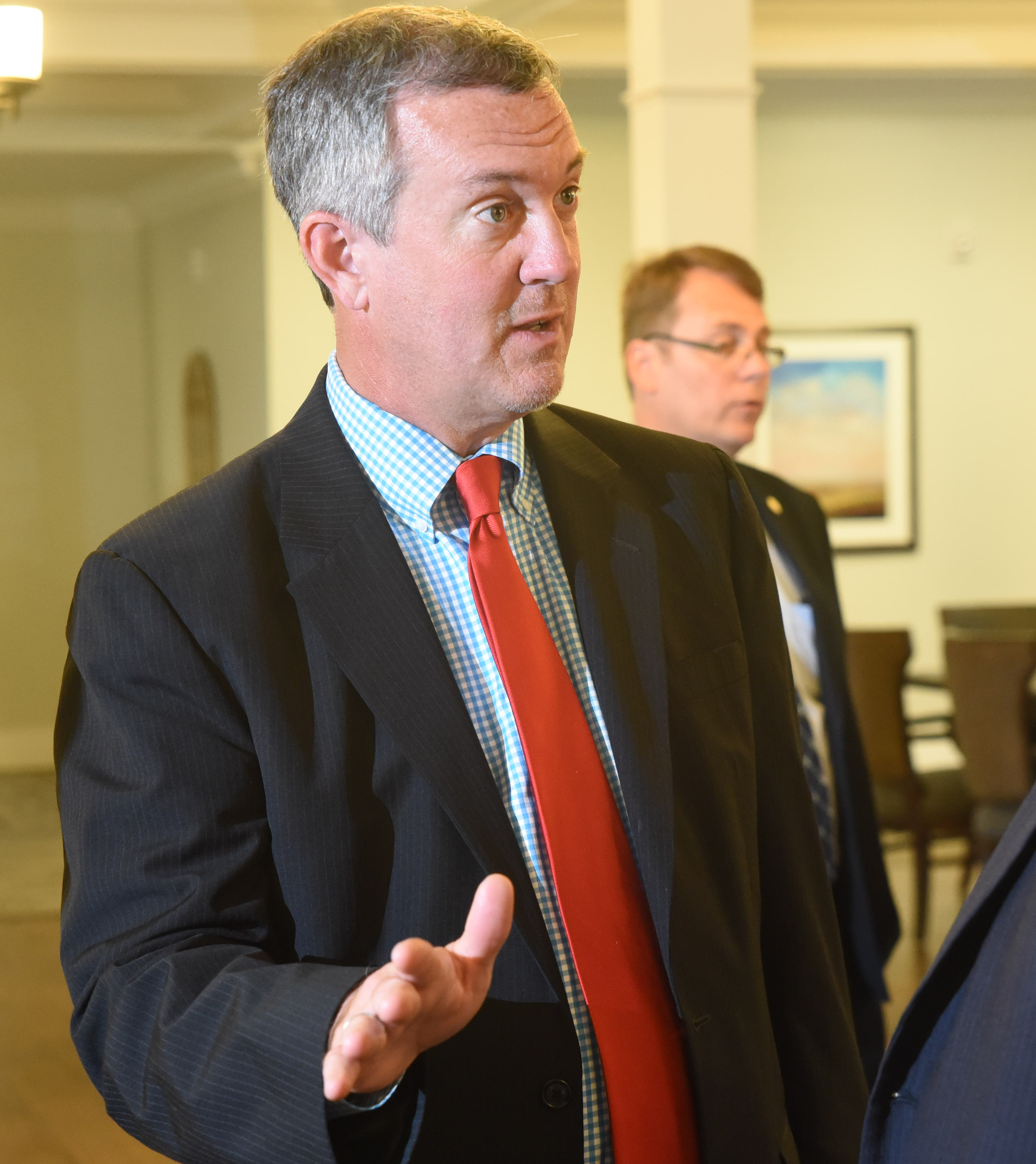NASHVILLE - Expecting a deluge of absentee mail-in ballots come November, a top U.S. Postal Service official has warned election officials in 46 states - including Tennessee, Georgia and Alabama - that the agency can't guarantee coronavirus-weary voters their mail-in ballots will arrive in time to be counted in the Nov. 3 presidential election.
In his July 29 letter to Tennessee Secretary of State Tre Hargett, one of dozens of similar letters sent to states obtained by The Washington Post, U.S. Postal Service General Counsel Thomas J. Marshall cautioned that Tennessee election law timelines for mail-in ballots appear "incompatible" with both the Postal Service's delivery standards and its recommended time frame to ensure on-time delivery.
Tennessee law allows registered voters to mail their requests for absentee ballots to their county election commission up to seven days prior to Election Day - Oct. 27 of this year's fall election, Marshall noted.
"At a minimum," Marshall wrote Hargett, Tennessee voters should submit their absentee ballot requests to local election commissions at least 15 days before Election Day "and preferably long before that time."
If a voter mails a request on or near Tennessee law's Oct. 27 deadline, and the ballot is transmitted to the voter by mail, Marshall warned, "there is a significant risk that the voter will not have sufficient time to complete and mail the completed ballot back to the election official in time for it to arrive by the state's return deadline. That risk is exacerbated by the fact that the law does not appear to impose a time period by which election officials must transmit a ballot to the voter in response to a request."
Hargett, a Republican, said in an interview Saturday that he told Postal Service officials, "Look, you had the opportunity to plan for this. Please do so, it's up to Tennessee law to decide when that ballot is late."
Per Tennessee law, mail-in ballots must arrive at county election commissions before the close of business on Nov. 3, Hargett said, adding, "We've had recent conversation with U.S. Postal Service representatives, and I believe based on what they told me, they're going to be up to the challenge of the additional mail."
Hargett also said what his office has to do is "make sure that people know that just because the ballot request [deadline] for an absentee ballot is Oct. 27, don't wait that long. If you want to get an absentee ballot, please hurry up and do so. Hurry up and get your request in so your election commission can get that ballot back to you and you can get that ballot back in."
Absentee voting has become a major flash point for Tennessee and the rest of the U.S. in the 2020 election, with it running headlong into both the COVID-19 pandemic and politics.
President Donald Trump has charged, without offering specifics, that Democrats are using mail ballots to try and "steal an election." In the meantime, there's an uproar over Trump's recently appointed new postmaster general, who has implemented major cuts causing mail delays.
The Atlanta Journal-Constitution reported that Kennith Beasley, the southern regional coordinator for the American Postal Workers Union, said that mail that previously took two to three days to deliver now often doesn't reach local addresses for five or six days.
Even before that began raging, Tennessee's tight legal restrictions limiting absentee voting mostly to voters ages 60 and older - with some exceptions for the sick and a few other categories - were swept aside by a Nashville judge who in June ruled Tennessee must allow all registered voters the option to cast a ballot by mail in light of the pandemic.
That resulted in an explosion of Tennessee absentee voting in the Aug. 6 state primary elections, with at least 115,000 people casting votes by mail, almost double the 64,199 officially certified absentee votes cast in the entire Nov. 8, 2016, general presidential election here.
Tennessee Attorney General Herbert Slatery and Hargett fought back against the universal absentee ballot ruling. But when the case went before the Tennessee Supreme Court, state officials unveiled a compromise, telling justices they were prepared to offer absentee ballots to voters who have health conditions or live with someone at risk for COVID-19. With that offer evidently fresh on justices' minds, they overturned the lower court's ruling that there be an option for all eligible voters to vote by mail in November.
Hargett told the Times Free Press, "I'm not going to get caught up in what Republicans and Democrats are saying about it. Our job across the state, all 95 election commissions, their job is to process those requests, to get the ballots turned around in timely fashion so people can then receive those ballots and get them turned back in by the close of polls on Election Day.
"That's what election commissioners around the state have to be focused on. And they can't be focused on the political rhetoric," Hargett stressed. "People are counting on us."
While U.S. Postal Service General Counsel Marshall's July 29 warning is grabbing attention, it's actually a follow through and amplification from similar cautions he issued May 29 to states. Marshall, also the Postal Service's executive vice president, cautioned election officials across the country that Postal Service turn-around time on first class mail is two to five days, with the turn-around time for most domestic marketing mail being three to 10 days.
Also in that letter, as reported by the Times Free Press in July, Marshall raised similar concerns over the COVID-19 pandemic driving dramatic increases in mail-in absentee balloting.
Hargett said he intends to drive the message home to would-be absentee voters and early voters to avoid dilly dallying.
"People are going to get tired of hearing us talk about early voting," Hargett vowed. "People are going to get tired of hearing us talking about hurry, get your absentee ballot back. People are going to get tired of us saying when the deadline request for an absentee ballot is."
Moreover, Hargett said they're "also going to get tired of hearing us talk about all of our efforts to make early voting for Election Day a clean and safe and secure environment," citing the masks, constant cleaning and other measures that workers in polling stations in all 95 counties are doing both for early voting, which runs from Oct. 14 through Oct. 29, as well as on the Nov. 3 election day.
"While we are certainly going to work with the United States Postal Service in every way possible," Hargett said, "the best way to ensure your vote is received and counted is by voting in person during early voting or on Election Day."
Contact Andy Sher at asher@timesfreepress.com or 615-255-0550. Follow him on Twitter @AndySher1.

